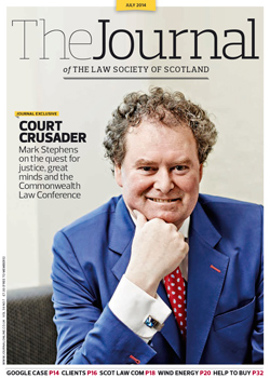Going off the rails

Delay
In Abram v British International Helicopters Ltd [2014] CSIH 53 (12 June 2014) the Inner House examined the operation of RCS, rule 21A.1, which is mirrored in OCR, rule 15.7.
This action for personal injuries, arising from an accident in 1988, was raised in 1990. It was sisted for two periods. Two debates had been discharged. Proof had been allowed in 2005, but by 2012 none had been assigned. Lord Drummond Young’s decision (July 2013 article) was affirmed. Lord Carloway had no difficulty in concluding that there were a number of examples of inordinate and inexcusable delay. He did not agree that searches for experts should only be undertaken when a proof was allowed: they should be carried out before the appropriate averment was made. Turning to the rule of court, his Lordship observed first that the court must be satisfied that there existed inordinate and inexcusable delay and as a result unfairness resulted. Thereafter, it required to exercise its discretion as to whether to dismiss the claim. The power was a draconian one of last resort. The crucial issue was whether the unfairness was such that a fair trial was no longer possible. If so, the proceedings required to be brought to an end. There had to exist “at least” a substantial risk that justice could not be done.
His Lordship also noted that there was a responsibility on the court to ensure litigation did not proceed in such a laissez-faire manner. Each party had responsibility to progress matters. The defenders’ agreement to proof being assigned did not amount to waiver of the right to seek dismissal based on undue delay.
In Fox v United Biscuits (UK) Ltd, Glasgow Sheriff Court, 17 June 2014 Sheriff Principal Scott dealt with an appeal against an exercise of OCR, rule 15.7. There had been a four-year “vacuum”. The sheriff was quite entitled to consider that this amounted to inordinate and inexcusable delay and had correctly considered the issue of unfairness. The sheriff had also recognised the draconian nature of the rule. He did not require to identify some discrete difficulty caused or created by the delay, to determine that the rule should be invoked. Unfairness was a broad test.
Abuse of process
Sometimes actions produce problem after problem. Anderson v Nicholson Brothers 2014 GWD 18-333 (1 April 2014) is one such. Amongst other matters, the record produced for the options hearing was not certified and contained new craves which had not been allowed by amendment. A corrected record was ordained to be produced; this was still inaccurate.
Various motions were argued before Sheriff Mann. While he accepted that the court had an inherent power to deal with abuse of process, this was not to be exercised lightly. The pursuer’s conduct of the litigation was not so inept as to lead to the conclusion that there was an abuse of process. Even if an action was hopelessly irrelevant, that did not in itself constitute an abuse of process. Issues of relevancy were properly disposed of at debate. The sheriff, however, concluded that because the record was not certified and was accepted to be inaccurate, he was entitled to refuse to receive a minute of amendment. He could not ascertain what constituted the correct averments and thus what was sought to be amended. The failure to certify the record constituted a default in terms of OCR, rule 16.2. Without the record there was no proper basis for a debate or proof. The court could deal with the default ex proprio motu, although no motion was made on these grounds. The action was dismissed. It might not have been an abuse of process, but the same result can be achieved in another way!
Decree on unopposed motion?
In Caduceus Investments v Border Property Development 2014 GWD 20-376 (25 April 2014), the pursuers enrolled for decree in a defended action. It was unopposed and decree was granted in chambers. On appeal, Sheriff Principal Stephen recalled the decree. She observed first that in a defended action, apart from determinations after debate or proof, decree should only be granted on default, abandonment, settlement, or summary decree. There was no default. The motion for decree did not correspond with the craves. There was no basis in the pleadings for decree in terms of the motion presented. Further, intimation of the motion had been given to solicitors who were not part of the process.
The sheriff principal observed that litigants were entitled to rely on the judiciary to apply the law carefully and exercise discretion properly. Unopposed motions required a sheriff to consider whether what was sought was competent; they did not result in the merits of a motion not being considered for such issues. The motion should have been put out for a hearing. At very least, the sheriff should have exercised his discretion appropriately. If that had been done, the motion would not have been granted. The defenders had been placed in a worse position than if they had been in default.
Perhaps many of these observations are of greater relevance for the bench. However the sting in the tail for practitioners is the sheriff principal’s awarding the expenses of the appeal to the defenders. Accordingly, in actions in which there is suspicion that the other side has lost interest/has a weak case, the proper approach is to take the recognised route to obtaining decree, as opposed to a short cut which may be ill considered and thus expensive.
Family actions
Sheriff Principal Scott made a number of interesting observations in Ahmed v Iqbal, Glasgow Sheriff Court, 6 June 2014. Simply because it was a family action did not justify a complete relaxation of the norms of procedure. Flexibility did not mean the rules in Chapter 33 could be applied out of proper procedural context.
After proof, the sheriff had granted decree of divorce and continued consideration of the issue of contact. At a subsequent child welfare hearing, an interim award was made. Sheriff Principal Scott observed that where a proof is concluded, a decision on the matters at issue is required from the court. The sheriff was in error in continuing consideration of a matter after proof. He was bound to make a final decision on the findings made. The course taken was incompetent. In deferring determination of the issue of contact, the sheriff was embarking on a further fact-finding agenda. That was different from determining an issue and then continuing matters to finalise arrangements, and was likely to affect a party’s rights of appeal. The child welfare hearing as a general rule should take place in advance of a proof; its purpose is to secure expeditious resolution of the dispute. A child welfare hearing after proof should not interfere with the expectation that the proof will result in a final decision.
Summary causes
In McFadyen v McGhee 2014 GWD 17-308 (17 April 2014) it was argued that if a summary cause passed the first calling, it was not open for an issue of competency to be raised subsequently. Sheriff Principal Lockhart had no difficulty in determining that such an issue can be raised by any party or the court at any stage. He also found the pursuer personally liable in expenses, as opposed to in a representative capacity, it being clear by the first calling that his appointment as executor dative was incompetent, a will having been discovered.
Diligence on the dependence
In Glasgow City Council v Board of Springboig St John’s School [2014] CSOH 76; 2014 GWD 16-287 Lord Malcolm confirmed that for an inhibition to remain in place, the test was whether there was sufficient cause for the diligence to remain. All that was required was a prima facie case.
Interim interdict
As an aside, in Mirza v Salim [2014] CSIH 51 (3 June 2014) both Lady Dorrian and Lord McGhie made observations about recall of an interim interdict. If the grant was unjustified and loss occurred as a result, damages generally follow. If an interim interdict is recalled, unless there has been a change in circumstances, the recall is conclusive proof that the order was wrongfully obtained. Malice is unnecessary. This should be borne in mind if an order is sought prior to service.
Alteration of interlocutors
The pursuer in Henderson v Greater Glasgow Health Board [2014] CSIH 41; 2014 GWD 17-307 had tendered a minute of amendment during proof. The Lord Ordinary refused to receive this and an appeal was not insisted in. A subsequent minute was tendered in substantially the same terms. This was refused on the basis that it was an attempt to alter the previous interlocutor, which had been signed and issued. The Inner House upheld this decision. To do otherwise would result in uncertainty.
Interest on expenses
In Phee v Gordon [2014] CSIH 50; 2014 GWD 20-383 Lord Eassie, delivering the opinion of the Division, observed that while interest could be sought on an award of expenses once the figure was decerned for, until the actual figure was ascertained, it could not be said that the sum had been wrongfully withheld. The exercise of a right in process was not a matter justifying modification of that general principle.
Auditor's report
In Singh v Gupta [2014] CSIH 54 (30 May 2014) the Inner House confirmed that the only matters to be considered when a note of objections is taken to a report from the auditor, are objections to specific items in that report.
Expenses: permanence applications
In City of Edinburgh Council, Petrs 2014 GWD 19-365 (April 2014) the petitioners were unsuccessful in their applications for permanence orders. Both parents sought expenses. Sheriff Kinloch refused these motions. The dispute had not been straightforward. The petitioners had acted responsibly in bringing the action, basing their decision on the views of experienced social workers. The opinion of the respondents’ expert had not been available to the petitioners when the action was raised. The petitioners had statutory obligations to act in the best interests of children in their care, and quick decisions regarding children were generally considered to be in their best interests. All parties had endeavoured to comply with the applicable practice notes. The petitioners’ conduct of the proceedings could not be criticised.
It seems to me that there may be merit in expenses in such applications being considered in a similar manner to proceedings by public bodies in the public interest which are subsequently unsuccessful. These tend to be dealt with on a no expenses to or by basis.
In this issue
- “The Union and the law” revisited
- Cartels: raising the stakes
- The cooling-off catch
- Attack vectors into the law: smartphones
- Money laundering: the Fourth way
- Has Glasgow morality come to Edinburgh?
- Reading for pleasure
- Opinion: Graeme McCormick
- Book reviews
- Profile
- President's column
- 10-year target
- Headline act
- Forget that you ever knew me
- The cooling-off catch (1)
- Tax devolution: the legal implications
- Ninth life
- Planning: how does the wind blow?
- Going off the rails
- Employee shares? Sort them yourself
- Angostura, anyone?
- National priorities
- Scottish Solicitors' Discipline Tribunal
- People on the move
- Heart of the action
- Helping solicitors on Help to Buy
- Conditions countdown
- Where bullocks fear to roam
- Fit to grant?
- Controlling the risks
- Ask Ash
- Opening up the law
- From the Brussels office
- Law reform roundup
- Post-corroboration Review update






